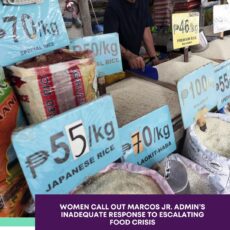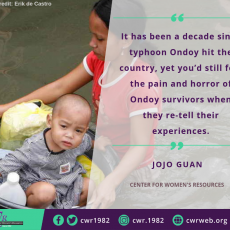The newly-elected officials need to face the task of addressing the unfulfilled commitment for the sustainable development goals (SDG) since the country is up for review in the UN this mid-year, according to a research and training institution for women.
The Center for Women’s Resources (CWR) posed the challenge to the newly-elected officials when it presented the report that reviewed the efforts of the Duterte administration to address the Sustainable Development Goals (SDGs).
The report focused on five priority goals namely Goal 4 on Quality Education, Goal 8 on Decent Work, Goal 10 on Reducing Inequalities, Goal 13 on Climate Action and Goal 16 on Peace, Justice and Strong Institutions. It looked into how government policies and programs addressed the plight of women and it presented stories of women from different sectors such as farmers, indigenous and national minorities, workers, urban poor, young women and professionals.
According to CWR research coordinator Cham Perez, these goals were selected primarily because these belong to the cluster that will be included in the country’s report to the Voluntary National Review (VNR) in the UN this July. VNR is part of the follow-up and review mechanism of the SDGs which facilitate sharing of ‘experiences including successes, challenges and lessons learned.’
“This review is timely since it looked back on how the government fared in meeting the SDGs. At the same time, it also brought to light women’s pressing issues that need to be addressed, especially now that we have newly-elected government officials who promised to bring change,” CWR research coordinator Cham Perez explained.
Findings revealed that despite the government’s commitment to meeting the SDGs, many issues have remained unaddressed. Among the issues highlighted in the report were: (Goal 4) limited access to free and quality education which results to low cohort survival rate (GIVE THE STATS) especially in XXXX, the region with highest poverty incidence; (Goal 8) lack – GIVE DATA of decent and regular jobs and the low – DATA labor force participation rate of women, as well as the rampant labor violations and abuse committed against women workers; (Goal 10) neoliberal economic policies which aggravated inequalities and limited the access to basic social services and protection; (Goal 13) low capacity of the poor to cope in times of extreme weather conditions and disasters and the continuing corporate plunder and environmental destruction; and (Goal 16) unabated – DATA human rights attacks and extrajudicial killings, widespread state-perpetrated violence against women and culture of impunity.
Perez remarked that if the implementation of the SDGs in the succeeding years will follow the same free market development framework like the Duterte administration’s 10-point agenda, inequality, poverty, injustice and culture of impunity will likely persist.
“If the government is serious and sincere in meeting the SDGs, it should re-examine its development framework, review and recall its macroeconomic neoliberal policies of privatization of social services, liberalization of trade, deregulation of prices, and denationalization of government assets to private investors. Such policies have burdened Filipinos, especially the poor and the marginalized,” Perez noted. “In the end, meeting the SDGs is simply upholding and protecting the rights of every Filipino to live free from poverty and inequality, and in peace and prosperity based on social justice. This is the challenge for the newly-elected officials. Their performance will show if they work for the people or live for profit,” Perez concluded.



